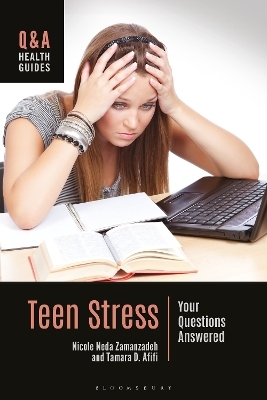
Teen Stress
Greenwood Press (Verlag)
978-1-4408-6558-9 (ISBN)
Overscheduling, the pressure to get into a good college, bullying, body image, conflicts with friends, and social media are just a few of the many sources of stress for today's teens. And, while teens may face just as many, if not more, stressors than adults, they are less likely to have the coping mechanisms and stress management tools needed to effectively combat the stress they feel.
Part of Greenwood's Q&A Health Guides series, Teen Stress: Your Questions Answered follows a reader-friendly question-and-answer format that anticipates readers' needs and concerns. Prevalent myths and misconceptions are identified and dispelled, and a collection of case studies illustrates key concepts and issues through relatable stories and insightful recommendations. Each book in the series also includes a section on health literacy, equipping teens and young adults with practical tools and strategies for finding, evaluating, and using credible sources of health information both on and off the internet—important skills that contribute to a lifetime of healthy decision-making.
Nicole Neda Zamanzadeh, PhD, earned her doctorate in communication at the University of California, Santa Barbara. Her research has focused on adolescents' relationships with their technology, family, and romantic partners. Tamara D. Afifi, PhD, is professor in the department of communication at the University of California, Santa Barbara. Her research focuses on communication patterns that foster resilience and thriving in families and other interpersonal relationships.
Series Foreword
Acknowledgments
Introduction
Guide to Health Literacy
Common Misconceptions about Teen Stress
1. Teens aren't stressed; they're just "seeking attention"
2. Adults and teens experience stress in the same way
3. Teen stress is frivolous; they sweat the "small" stuff
4. Stress is always bad
5. Teen stress is a new phenomenon
Questions and Answers
General Information
1. What is stress?
2. How can teenage stress ever be good?
3. What indicates a teen is experiencing stress?
4. What's the difference between acute and chronic stress?
5. How is the stress that teens feel different from the stress adults experience?
6. How does teen stress today differ from the past?
7. What is digital stress?
8. Is stress contagious?
Sources of Teen Stress
9. What is bullying? How can bullying and cyberbullying cause teen stress?
10. How do revenge porn, cyberstalking, and cybersex harassment cause teen stress?
11. How can social media use cause teen stress?
12. How can the fear of missing out (FOMO) cause teen stress?
13. How can being online, using smartphones, and playing video games become addictive and cause teen stress?
14. How can multitasking cause teen stress?
15. How can academic pressure cause teen stress?
16. How does the process of being college-bound and beginning college create teen stress?
17. How can friendships and peer pressure cause teen stress?
18. How do romantic relationships cause teen stress?
19. How do teens' developing sexuality and sexual identity contribute to teen stress?
20. How do teens experience financial stress?
21. How can being a first-generation American create teen stress?
22. How does body image create teen stress?
23. How does childhood trauma create teen stress?
24. How does discrimination via microaggression and direct aggression cause teen stress?
25. How does death and grief cause teen stress?
26. How can parental divorce or separation create teen stress?
27. How does the need for privacy and freedom create teen stress?
28. How does identity formation create teen stress?
Consequences of Stress
29. How does stress affect physical health?
30. How does stress affect mental health?
31. Could stress be harming someone's health even if they don't think they're stressed?
32. Can stress be harmful for relationships?
33. Does stress lead to even more stress? If so, how?
Resilience and Managing Stress
34. What can protect someone from experiencing excess stress?
35. Which coping strategies are useful for teens, and when?
36. What resources can teens use to help manage stress and crisis?
37. When should teenagers consider receiving professional help for coping with their stress?
38. When is psychiatric medication an appropriate tool for helping teens manage stress?
39. As a teen, how can you help a friend who's experiencing stress?
40. How and when is it best for parents to offer support to their stressed teens?
41. How can parents, parental figures, mentors, and caregivers help teens manage their digital stress?
42. How can mindfulness and meditation help manage stress?
43. How can daily habits help teens prevent and manage stress?
44. Can engaging in video games, TV, music, and social media be a useful coping tool for teenagers?
45. How can teens experience more resilience to stress and learn to thrive?
Case Studies
1. Antonio struggles with sexual and gender identity
2. Tiffany and Alicia are fighting
3. High school is hard work for Ricky
4. Kim is worried about being on her own at college
5. Dante doesn't feel like he belongs
Glossary
Directory of Resources
Index
| Erscheinungsdatum | 01.10.2020 |
|---|---|
| Reihe/Serie | Q&A Health Guides |
| Sprache | englisch |
| Maße | 156 x 235 mm |
| Gewicht | 255 g |
| Themenwelt | Sachbuch/Ratgeber ► Gesundheit / Leben / Psychologie ► Psychologie |
| Geisteswissenschaften ► Psychologie ► Entwicklungspsychologie | |
| Sozialwissenschaften ► Soziologie | |
| ISBN-10 | 1-4408-6558-2 / 1440865582 |
| ISBN-13 | 978-1-4408-6558-9 / 9781440865589 |
| Zustand | Neuware |
| Haben Sie eine Frage zum Produkt? |
aus dem Bereich


